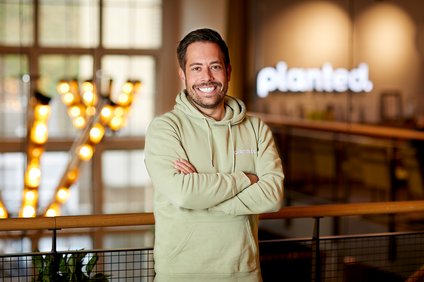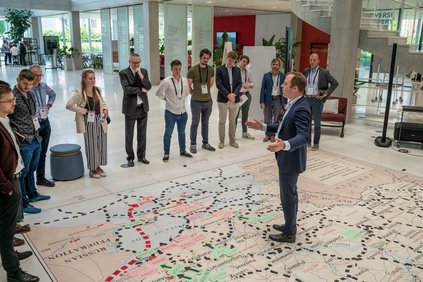People - 07.07.2023 - 14:30
6 Questions for the St.Gallen "architect of the new world of work" Prof. Dr. Heike Bruch
For more than a decade, St.Gallen leadership professor Heike Bruch has been shaping the development of human resource management and is thus one of the most influential architects of the world of work. What does the recently awarded researcher think about the way we work and lead today?

The editors of “Personalmagazin” have chosen the 40 leading minds in human resource management in Germany. This year, the special category “Big Five” was created for the first time.
With this category, the editors of Personalmagazin honour all those who have been included more than five times in the list of the "40 leading HR minds" published every two years. Prof. Dr. Heike Bruch is one of the "Big Five". She is a professor of leadership at the University of St.Gallen and heads the Institute for Leadership and Human Resource Management (IFPM-HSG). In addition, HSG professor Antoinette Weibel was honoured in the "Science" category. She is Director at the Research Institute for Work and Working Environments (FAA-HSG), researches trust and the use of new technologies in organisations.
"We award personalities who really have influence and can make a difference, both in companies and in the HR community and society," says Reiner Straub, publisher of Personalmagazin, on the occasion of the announcement of the award in July 2023. He emphasises: "The 40 HR heads are the architects of the new working world."
What does the blueprint for New Work look like? We asked Heike Bruch.
Ms. Bruch, you are considered one of the most influential experts on leadership and new working environments. How do you like to work yourself? And what blocks you in everyday work?
I like to work with energy and focus. I put my heart and soul into it and concentrate on things that make sense to me and that I can change something for the better. What blocks me and what I tend to avoid are negative people, bureaucracy and rigid structures.
If you look back at the beginning of your research work: What major changes have become apparent in the world of work? What are the consequences for companies and society?Above all, there is a shift towards New Work and empowerment. The flexibilization of working times and locations, as well as a rethinking of the hierarchy, have already fundamentally changed the world of work. More disruption will follow from AI, labour shortages and sustainability. New work means: More freedom, flexibility and general options for employees. It also means a fulfillment of meaning. At the same time, this entails new challenges: the blurring of the boundaries between work and leisure and constant availability entails the risk of emotional exhaustion. In many cases, virtual collaboration leads to isolation and a loss of team cohesion. Some of our topics gain enormously in importance. Energy, the acceleration trap, or modern leadership for example. They were always important. But now they are existential and urgent.
What impact has the pandemic had on the world of work – and the way teams and managers now work together?
The pandemic was the catalyst of a major change that we call "New Work Transformation". Suddenly, and for many companies which were completely unprepared, a new way of working suddenly appeared. It went surprisingly well for many. First it changed again when the time of the “forced home office” came to an end. Right now, we're experiencing a lot of frustration, from heated to aggressive discussions about the topic of New Work. Some companies have seen the pandemic as an opportunity and developed a new, hybrid work culture and positioned themselves in a very modern way.
The majority, however, so far have not. Because the pandemic has forced many to New Work, they have created the technical and structural framework for this, but more out of necessity to keep the business going. However, what needs to be done now for New Work to work is to develop the culture and leadership accordingly. Without a "New Culture", characterized by modern leadership, trust, vision, exemplary behavior by superiors and self-management skills, New Work leads directly to the acceleration case – i.e. to excessive demands and exhaustion. Currently 39% of companies belong to the so-called "modern overwhelmed". Turning back the clock is not an option.
You deal with leadership, organizational energy, healthy high performance, new forms of work, employer attractiveness and demographic management in companies. Which of these areas is currently challenging you the most? And why?
This is a difficult question, because various topics are currently coming into focus in practice. These issues have always been important, but now they are becoming existential. And I'm not only talking about companies, but also about essential, stabilizing sectors such as the health sector, schools and churches and the social effects that depend on them. We therefore start our research and practical work on several topics at the same time. "Re-energize" is the motto that guides us. It is important to better mobilize energy in companies and to promote speed, agility and innovation. At the same time, many people, teams and entire companies are tired. Here are some of our starting points: Support the exhausted managers, counteract the labour shortage and promote the mental health of Generation Z in particular. It is particularly relevant to us that we succeed in setting up organizations sustainably – healthy, with the next generation in mind and ecologically sustainable. However, this requires a cultural transformation in the direction of healthy high performance.
With a view to the "increasing malaise" in companies, as you see among managers and observing employees: How can healthy high performance be achieved?
I find our latest findings on exactly this question very interesting, some of which we have only published: Many companies are under enormous pressure – more speed, efficiency, innovation, change, etc. Many counter the pressure by passing on the pressure to existing systems, increasing intensity and stroke rate. These are companies on the limit. Others change the system – we call these healthy high-performance companies. They differ fundamentally from the others in terms of how they deal with energy (boosting productive and pleasant energy versus widespread resigned indolence and acceleration trap), modern leadership (inspiring multimodal versus authoritarian or laissez-faire leadership) and future-oriented people management (development-promoting and emotionalizing versus performance-focused). Interestingly, healthy, high-performing companies are not only much more attractive to employees, they are also much more economically successful – on course with a healthy culture.
School holidays in St.Gallen start today – if you could switch to “workation” tomorrow: From where and how would you prefer to work?
During the holidays, I regularly switch to workation mode. I prefer to spend time on a small Island in the North Sea.
More articles from the same category
This could also be of interest to you
Discover our special topics








![[Translate to English:] 52. St.Gallen Symposium | unisg.ch](https://www.unisg.ch/fileadmin/_processed_/1/b/csm_ISC-Opening-0161_475504495c.jpg)







